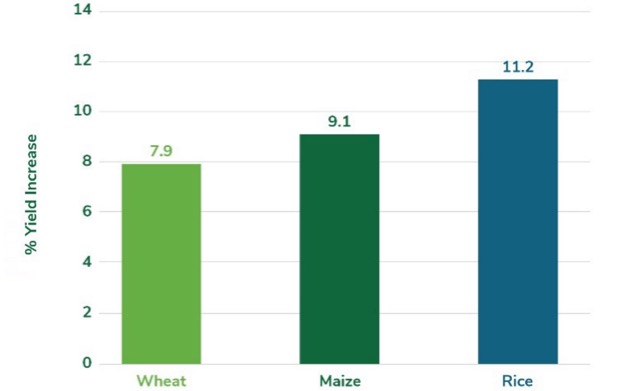RLF AgTech debuts ‘breakthrough’ Veridium seed priming technology to global markets

The global seed treatment market is predicted to be worth US$13.5 billion by 2025.
RLF AgTech (ASX: RLF) has launched its “breakthrough” Veridium seed priming technology to global markets, which will increase yields for growers.
Veridium is RLF’s latest proprietary technology that delivers plant-available nutrition directly to the seed – improving soil moisture and fertiliser uptake.
Trials with Veridium show large gains in wheat, maize and rice – “over and above” existing technologies.
During trials, 100 grams of Veridium on rice seed yielded more than an additional 1-tonne of grain per hectare.
Unlike current seed treatment applications, Veridium is applied directly to the seed before planting – by both seed breeders and growers.

Yield increases with Veridium Seed Priming Technology vs control.
The seed absorbs the product, which increases its nutrient levels and results in enhanced soil moisture and fertiliser uptake, as well as vigour and plant growth in the first 45 days of the plant’s life.
“Veridium is a breakthrough addition to RLF’s product portfolio,” RLF managing director Ken Hancock said.
“Our research to-date shows that the use of Veridium as an integrated component of RLF’s product suite, will empower farmers to drastically increase yield and profits.”
Veridium market
The company’s trials indicate when Veridium is used on wheat it gives a return of 4.35-times the investment, while maize provides 423-times the investment and rice 300-times.
It is predicted the global seed treatment market will by worth US$13.5 billion by 2025.
Increasing at a compound annual growth rate of 12.19%, RLF says it is one of agriculture’s fastest-growing sectors.
“RLF considers more efficient and successful seed treatment to be of critical importance in the move to achieve a 50% increase in food production – which the United Nations estimates to be required to meet growing demand by 2030,” Mr Hancock said.
He said the company was positioned to make a “vital contribution” to the world’s escalating hunger crisis.
“If our trial results were extrapolated across the world’s rice crops, Veridium would increase food supply to feed 1.3 billion people their annual rice consumption,” Mr Hancock explained.
“This new product represents an exciting step forward in our commitment to sustainable, regenerative global farming practices – and helping farmers be more efficient with fertiliser,” he added.
